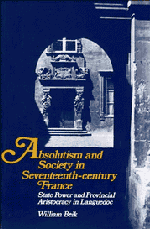 Absolutism and Society in Seventeenth-Century France
Absolutism and Society in Seventeenth-Century France Book contents
- Frontmatter
- Contents
- List of tables
- List of figures
- Preface
- List of abbreviations
- Map: Languedoc in the seventeenth century
- PART ONE INTRODUCTION
- PART TWO THE DISTRIBUTION OF AUTHORITY
- PART THREE THE PROVINCE ON ITS OWN
- PART FOUR THE PROVINCE AND THE CROWN
- Conclusion
- Appendix: Breakdown of taxes from the diocese of Toulouse, 1677
- Select bibliography
- Index
- Frontmatter
- Contents
- List of tables
- List of figures
- Preface
- List of abbreviations
- Map: Languedoc in the seventeenth century
- PART ONE INTRODUCTION
- PART TWO THE DISTRIBUTION OF AUTHORITY
- PART THREE THE PROVINCE ON ITS OWN
- PART FOUR THE PROVINCE AND THE CROWN
- Conclusion
- Appendix: Breakdown of taxes from the diocese of Toulouse, 1677
- Select bibliography
- Index
Summary
In his memoirs Charles de Montchal, archbishop of Toulouse from 1628 to 1651, lashed out bitterly at the governmental policies of his day, especially the attack on the clergy which he attributed to the greed and arrogance of Cardinal Richelieu. In Montchal's view Louis XIII was a just and wise monarch, but Richelieu was a usurper who put pride above service and literally wore out the king with his misguided projects. In the interest of his own vanity, the cardinal had abandoned the opportunity to effect a general conversion of the Huguenots at the Siege of Montauban in 1629. He had insulted the pope, manhandled the religious orders, and attacked the Sorbonne. When only the bishops were left to protect the church, he incited the regular orders against them and packed the ranks of the episcopacy with sycophantic ‘men of low birth’. Meanwhile clerical elections were fixed, and the bishops' right to assemble was denied although they ‘have always had the right to assemble to consider their affairs, like the basest of artisans’.
The crux of the matter was financial privilege. In 1639 the edict on amortissements led to seizures of clerical property and harassment of the clergy. Then new offices and augmentations de gages were forced on the church, and disputes with the sub-farmers of these disguised taxes led to the imprisonment of various agents of Montchal and his cathedral chapter.
- Type
- Chapter
- Information
- Absolutism and Society in Seventeenth-Century FranceState Power and Provincial Aristocracy in Languedoc, pp. 329 - 339Publisher: Cambridge University PressPrint publication year: 1985
